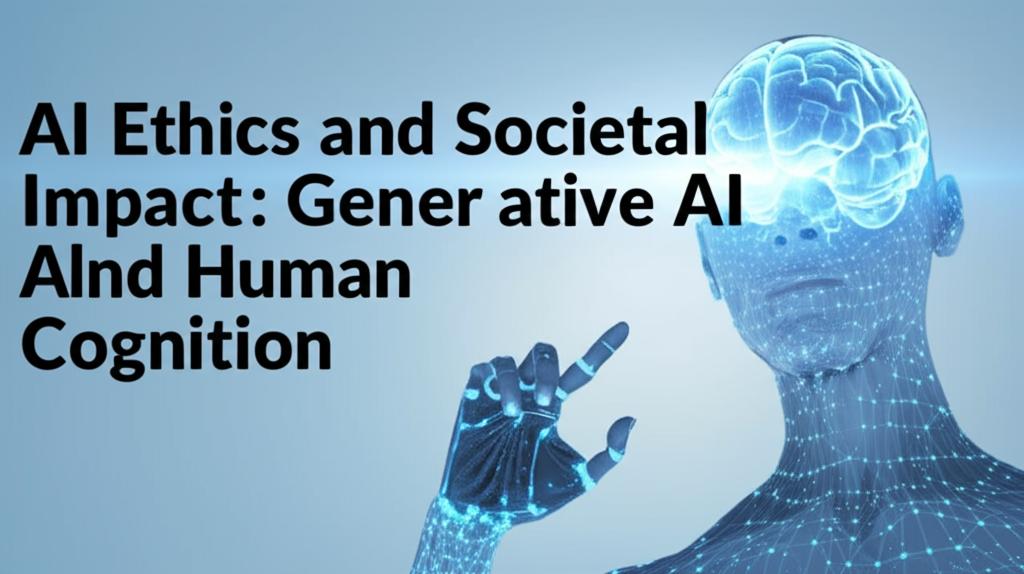Generative AI is rapidly changing how we create, learn, and even think. This technology, capable of producing novel content like text, images, code, and music, presents both exciting opportunities and significant ethical and societal challenges, particularly concerning its impact on human cognition.
Enhancing and Altering Human Cognition:Generative AI can augment human cognitive capabilities in several ways. It can assist in brainstorming, overcome creative blocks, and manage non-creative aspects of projects, potentially democratizing innovation. In education, AI tutors and personalized learning platforms can tailor instruction and enhance accessibility, especially for students with disabilities. AI can also speed up data processing, design, and content production, leading to improved outcomes and increased creativity.
However, the increasing reliance on generative AI raises concerns about the potential decline of essential human cognitive skills. Over-reliance on these tools could diminish critical thinking, problem-solving abilities, and even memory, as individuals may offload cognitive tasks to AI. There are worries that as tasks become automated, traditional skills and human creativity could be devalued. The ease with which AI generates content might also lead to a homogenization of ideas and a reduction in the depth of learning.
Ethical and Societal Implications:The societal impact of generative AI is multifaceted and warrants careful consideration.
- Bias and Fairness: AI models are trained on vast datasets, which can reflect and amplify existing societal biases related to race, gender, culture, and other characteristics. This can lead to discriminatory outputs in sensitive areas like hiring, lending, and even creative content, reinforcing harmful stereotypes and excluding underrepresented groups.
- Misinformation and Deepfakes: The ability of generative AI to create highly realistic but fabricated content (deepfakes) poses a significant threat. This can exacerbate the spread of misinformation and disinformation, potentially eroding public trust and impacting democratic processes. Children, with their still-developing cognitive abilities, are particularly vulnerable to manipulation by synthetic content.
- Intellectual Property and Ownership: Generative AI raises complex questions about copyright and ownership of AI-generated content, as models are often trained on existing copyrighted material without explicit permission. This poses challenges for creators and current legal frameworks.
- Job Displacement and Economic Impact: While AI may create new tech jobs, it also has the potential to replace jobs involving repetitive tasks or information generation, leading to economic disruption and requiring a rethinking of skills and employment.
- Privacy Concerns: The collection and analysis of personal data to train AI models and provide personalized experiences raise significant privacy concerns.
- Human-AI Interaction and Trust: As AI systems become more sophisticated and capable of human-like interaction, there are concerns about emotional dependence on AI. The anthropomorphization of AI agents can lead to misplaced interpersonal trust, bypassing the societal structures designed to ensure accountability and safety.
- Cultural Impact and Homogenization: There are concerns that AI-generated content might lead to a 'synthetic reality loop,' where future AI models are trained predominantly on AI-generated data. This could detach AI from genuine human experiences and perspectives, leading to a digital landscape that is less reflective of human diversity and more aligned with algorithmic interpretations of the world. This also includes the risk of cultural misappropriation, particularly concerning Indigenous knowledge and art.
Addressing the ethical and societal impacts of generative AI requires a multi-pronged approach:
- Promoting AI Literacy and Critical Thinking: Educating the public, especially students, about the capabilities, limitations, and ethical implications of generative AI is crucial. This includes fostering critical thinking skills to evaluate AI-generated content and identify potential biases or misinformation.
- Ethical Development and Deployment: Developers and organizations must prioritize responsible AI practices. This involves addressing biases in datasets and algorithms, ensuring transparency in how AI systems operate, and considering the potential societal impact of their creations. User involvement, particularly from diverse and vulnerable communities, is essential in designing and implementing AI systems.
- Regulation and Governance: Modernizing public policy and legal frameworks is necessary to address the unique challenges posed by generative AI. This includes clarifying liability standards, protecting intellectual property, and establishing guidelines for the ethical and responsible deployment of AI.
- Fostering Human-AI Collaboration: The goal should be to use AI as a tool to augment human capabilities and creativity, rather than replace them entirely. Encouraging active engagement with AI tools, where humans guide, refine, and critically evaluate AI outputs, can help mitigate the risks of cognitive decline.
- Interdisciplinary Research: Continued research is needed to understand the complex and evolving relationship between generative AI, human cognition, and society. This includes exploring new ways to assess learning and cognitive engagement in an AI-assisted world.
In conclusion, while generative AI offers transformative potential, its integration into society demands a proactive and thoughtful approach. By fostering ethical development, promoting critical engagement, and adapting our societal frameworks, we can aim to harness the benefits of generative AI while mitigating its risks to human cognition and societal well-being.

